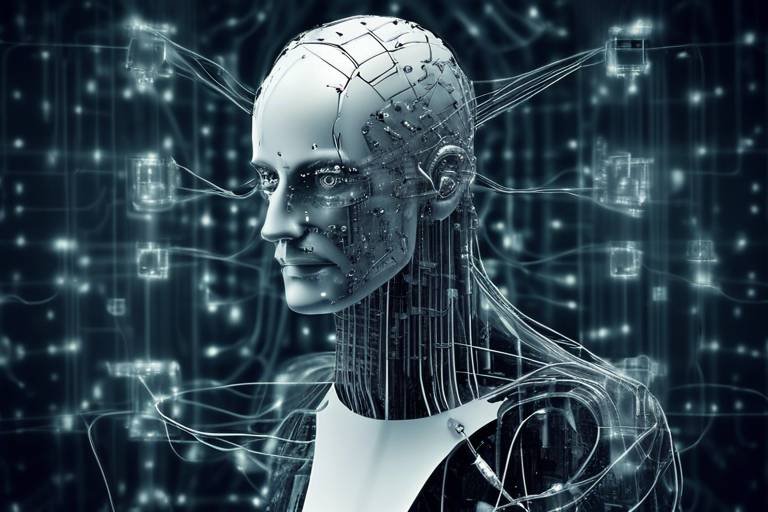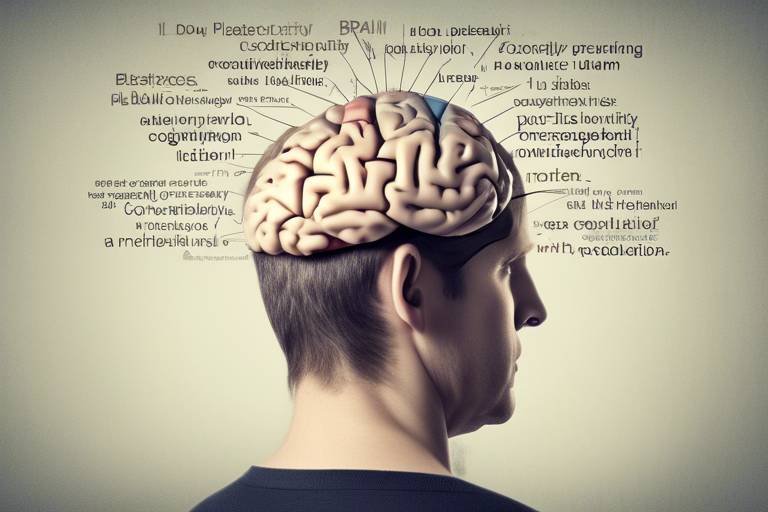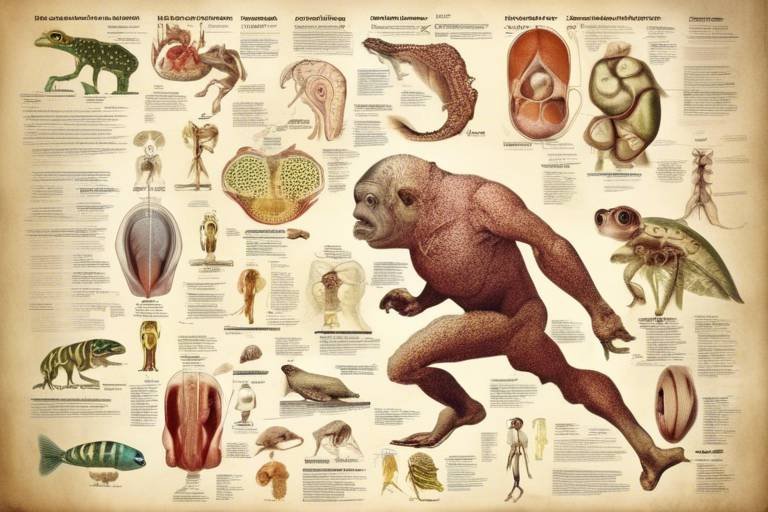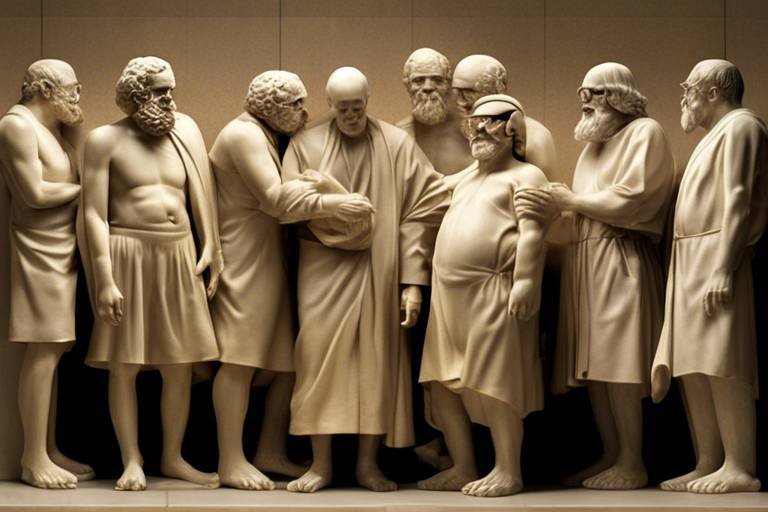Cognitive Science and Philosophy - Understanding Human Perception
The realm of cognitive science and philosophy intertwines in fascinating ways, particularly when it comes to understanding human perception. Have you ever wondered how your brain interprets the world around you? Why does a sunset feel so different from a bustling city street? This article takes you on a journey through the intricate dance between our cognitive processes and philosophical inquiries, aiming to unveil the mysteries of perception and its profound implications for knowledge, reality, and consciousness.
At its core, perception is the process through which we interpret sensory information. It’s like a complex puzzle where our senses gather pieces, and our brain assembles them into a coherent picture of reality. But what happens behind the scenes? When light hits our eyes, sound waves vibrate our eardrums, or scents waft into our nostrils, our brain kicks into high gear, processing this information and weaving it into our conscious experience. This intricate process raises some intriguing philosophical questions. Are we truly seeing the world as it is, or are we merely interpreting it through the lens of our experiences and biases? The answers to these questions are not just academic; they can shape our understanding of what it means to know something.
Cognitive science plays a pivotal role in unraveling the mechanisms behind perception. By studying how we pay attention, remember, and integrate sensory information, researchers are piecing together the puzzle of human experience. For instance, did you know that our attention can filter out certain stimuli, allowing us to focus on what we deem most important? This phenomenon, known as selective attention, highlights how our perceptions can be influenced by our mental state. Cognitive scientists employ various methods, from brain imaging to behavioral studies, to explore these processes. The findings not only enrich our understanding of the human mind but also challenge long-held philosophical notions about the nature of reality. As we delve deeper, we discover that perception is not just a passive reception of data; it’s an active construction of our reality.
Philosophers have long debated the nature of perception, giving rise to several key theories. Each theory offers a unique perspective on how we interpret the world around us. Here are a few of the most influential:
- Realism: This theory posits that the world exists independently of our perceptions. In other words, there is an objective reality that we can access through our senses.
- Idealism: In contrast, idealism suggests that reality is mentally constructed. According to this view, our perceptions shape our understanding of the world, implying that what we see is influenced by our consciousness.
- Phenomenology: This approach emphasizes the importance of subjective experiences. It argues that understanding perception requires examining how we experience phenomena from our unique perspectives.
These philosophical frameworks influence how we think about reality and our place within it. They challenge us to consider whether our perceptions are reliable or if they merely reflect our internal states.
Diving deeper into the debate between realism and idealism reveals fascinating contrasts. Realists argue that our senses provide a window into an external world that exists independently of us. Imagine looking at a tree; a realist would assert that the tree exists whether or not someone is there to see it. On the other hand, idealists would argue that the very act of perceiving the tree shapes its existence in our minds. This clash of perspectives raises crucial questions: Can we ever truly know the world outside our perception? Or is our understanding forever colored by our subjective experiences?
Phenomenology invites us to focus on the richness of our lived experiences. It encourages us to explore how our feelings, memories, and contexts shape our perceptions. For instance, consider how a familiar song can evoke powerful memories, altering how we perceive the moment. This subjective experience is central to phenomenological philosophy, suggesting that understanding perception requires more than just analyzing sensory input; it demands an exploration of our emotional and contextual landscapes.
The mind-body problem is another critical aspect of the discussion surrounding perception. How do our mental states relate to physical processes? Cognitive science and philosophy approach this issue from different angles. Some argue that mental states are merely byproducts of physical processes in the brain, while others contend that consciousness cannot be fully explained by physical interactions alone. This ongoing debate invites us to ponder profound questions about the nature of our existence and the essence of consciousness itself.
Understanding perception has far-reaching implications for knowledge and reality. It challenges us to reconsider what we believe to be true. Are our perceptions a reliable foundation for knowledge, or are they fraught with errors and biases? Cognitive science reveals that our perceptions can be deceiving, influenced by factors like cognitive biases and contextual cues. This understanding leads to important epistemological considerations, prompting us to question the very nature of truth.
Perception is at the heart of epistemology, the study of knowledge. It raises critical questions about how we acquire knowledge and the reliability of our senses. For example, optical illusions can trick our brains into seeing something that isn’t there. Such perceptual errors highlight the challenges we face in discerning truth from illusion. As we navigate this complex landscape, we must remain vigilant about the limitations of our perceptions and the biases that can cloud our understanding.
With advancements in artificial intelligence (AI), the relationship between human perception and machine perception is becoming increasingly relevant. AI systems can now analyze and interpret sensory data, raising philosophical questions about what it means for a machine to "perceive." Can machines truly understand the world in the same way humans do, or are they merely mimicking perception? This inquiry not only challenges our definitions of perception but also prompts us to consider the ethical implications of machines that can perceive and interact with the world.
- What is the difference between perception and reality? Perception is how we interpret sensory information, while reality refers to the objective state of things outside our perception.
- How does cognitive science study perception? Cognitive science employs various methods, including behavioral studies and brain imaging, to understand how we process sensory information.
- What are some examples of perceptual biases? Common biases include confirmation bias, where we favor information that confirms our existing beliefs, and the framing effect, where the way information is presented influences our perception.
- Can machines perceive like humans? While AI can analyze sensory data, whether they "understand" it in the same way humans do is a subject of ongoing philosophical debate.

The Nature of Perception
Perception is one of those fascinating aspects of human existence that often goes unnoticed until we stop to think about it. It's like the background music in a movie—essential, yet frequently overlooked. At its core, perception involves the way our brains process and interpret sensory information from the world around us. Imagine walking through a bustling market; the vibrant colors of fruits, the aromatic spices wafting through the air, and the cacophony of voices all blend together to create a rich tapestry of experience. But how does our brain make sense of all this sensory overload? This is where the magic of perception comes into play.
To break it down, perception can be understood through several key components:
- Sensory Input: This is the raw data that our senses collect—sight, sound, touch, taste, and smell. Each sense provides a unique perspective on the world.
- Processing: Once the sensory information is gathered, our brain begins to process it. This involves organizing and interpreting the data, often influenced by our past experiences and expectations.
- Interpretation: Finally, the brain interprets the processed information, leading to our conscious experience of reality. This is where things can get tricky, as perception is not always an accurate reflection of the external world.
What’s truly mind-blowing is how our perceptions can vary from person to person. Take, for example, the classic optical illusion. What one person sees as a simple image can evoke a completely different interpretation in someone else. This subjectivity raises profound philosophical questions: If our perceptions are so varied, how can we trust them to convey the truth about reality? Are we all living in our own unique worlds, shaped by our individual experiences and biases?
Philosophers have long debated these questions, leading to intriguing theories about the nature of perception. Some argue that perception is a direct reflection of the external world (realism), while others posit that our perceptions are shaped by our minds and experiences (idealism). This debate is not merely academic; it has real implications for how we understand knowledge and reality. Imagine if we could only see a fraction of what exists around us, like looking through a keyhole into a vast room. What would we miss? Would our understanding of the world be fundamentally flawed?
Moreover, cognitive science provides essential insights into how our brains work. Research shows that our perceptions are influenced by various factors, including attention, memory, and even cultural background. For instance, studies on attention reveal that we tend to focus on specific details while ignoring others, which can lead to perceptual biases. This phenomenon is akin to watching a magician perform tricks; our attention is drawn to the flashy movements, causing us to miss the subtle sleight of hand that makes the illusion possible.
In conclusion, the nature of perception is a complex interplay between sensory input, cognitive processing, and individual interpretation. It challenges us to consider the very essence of reality and how we come to know it. As we delve deeper into the realms of cognitive science and philosophy, we uncover not just how we perceive the world, but also how that perception shapes our understanding of existence itself.
- What is perception? Perception is the process by which our brains interpret sensory information to form our understanding of the world.
- How does perception differ from reality? Perception can be subjective and influenced by individual experiences, while reality is the objective state of the world.
- Can perception be trusted? While perception is essential for navigating our environment, it can be flawed and influenced by biases, making it important to question our interpretations.

The Role of Cognitive Science
Cognitive science is like a treasure map leading us through the intricate landscape of the human mind. It combines insights from psychology, neuroscience, artificial intelligence, linguistics, anthropology, and philosophy to unravel the mysteries of how we perceive the world around us. Imagine trying to solve a puzzle where each piece represents a different aspect of how we think, learn, and understand our surroundings. The role of cognitive science is pivotal in piecing together this complex puzzle, especially when it comes to perception.
At its core, cognitive science investigates the processes that govern our thoughts and perceptions. How do we interpret sensory information? Why do we sometimes see things that aren't there or miss things that are right in front of us? These questions are not just academic; they have real-world implications. For instance, cognitive science studies how attention works, revealing that our brains can only focus on a limited amount of information at once. This phenomenon is often illustrated by the “inattentional blindness” effect, where individuals fail to notice unexpected objects in their visual field when focused on a specific task.
Moreover, cognitive science delves into memory and how it affects our perception. Our memories are not perfect recordings of past events; they are more like a highly edited movie, influenced by our emotions, biases, and the context in which we experienced them. This editing process can lead to perceptual errors, where our recollections shape our understanding of reality in ways that may not align with the actual events. For example, the phenomenon of “false memories” demonstrates how easily our minds can be swayed, raising questions about the reliability of perception as a source of knowledge.
Another fascinating aspect of cognitive science is sensory integration. Our brains constantly receive a barrage of sensory information—from sight and sound to touch and taste. Cognitive science examines how these various inputs are processed and combined to form a coherent perception of the world. Think about it: when you see a delicious meal, you don’t just see the colors and shapes; you also anticipate the smell and taste, all thanks to the brain's ability to integrate sensory information. This integration is crucial for creating a rich and immersive experience of reality.
To illustrate the significance of cognitive science, let’s consider a few key areas where it enhances our understanding of perception:
- Attention: Understanding how we focus on certain stimuli while ignoring others sheds light on our perceptual capabilities.
- Memory: Studying how memories influence perception helps us comprehend the fluid nature of our understanding of reality.
- Sensory Integration: Exploring how our brain combines different sensory inputs reveals the complexity of our perceptual experiences.
In conclusion, cognitive science plays a crucial role in enhancing our understanding of human perception. By examining the intricate workings of the mind, it provides valuable insights that challenge our assumptions about reality and knowledge. As we continue to explore this fascinating field, we uncover not only the mechanisms of perception but also the profound implications they hold for our understanding of consciousness and existence itself.
Q: What is cognitive science?
A: Cognitive science is an interdisciplinary field that studies the mind and its processes, incorporating insights from psychology, neuroscience, artificial intelligence, linguistics, anthropology, and philosophy.
Q: How does cognitive science relate to perception?
A: Cognitive science investigates how we perceive the world, including how sensory information is processed, how attention influences perception, and how memory affects our understanding of reality.
Q: What are some common phenomena studied in cognitive science?
A: Common phenomena include inattentional blindness, false memories, and sensory integration, all of which reveal the complexities of human perception.
Q: Why is understanding perception important?
A: Understanding perception is crucial because it shapes our beliefs, influences our interactions with the world, and impacts how we acquire knowledge.

When we dive into the world of philosophical theories of perception, we encounter a fascinating landscape filled with diverse perspectives that seek to explain how we perceive the world around us. At the heart of this discourse are three primary theories: realism, idealism, and phenomenology. Each of these theories offers a unique lens through which we can examine the intricate relationship between perception and reality, challenging our understanding of what it means to truly "see" or "experience" the world.
Realism, for instance, posits that the world exists independently of our perceptions. This theory suggests that our sensory experiences provide us with a direct connection to the external world. Imagine standing in front of a vibrant sunset; according to realism, the colors and beauty you perceive are not mere figments of your imagination but rather an accurate reflection of the world as it is. This perspective aligns closely with the scientific approach, emphasizing the importance of objective reality and the belief that our perceptions can be validated through observation and measurement.
On the other hand, idealism presents a contrasting view. Idealists argue that reality is fundamentally shaped by our perceptions, suggesting that what we see is not an unmediated experience of the world, but rather a construct of our minds. This theory raises intriguing questions: Are we merely experiencing a subjective reality? When we look at that same sunset, is it the colors and shapes that exist independently, or is it our mind that gives them meaning? In this light, the act of perception becomes a creative process, where the observer plays a crucial role in shaping the experience.
Then we have phenomenology, which takes a different approach altogether. This philosophical movement, founded by Edmund Husserl, emphasizes the importance of lived experiences and the subjective nature of perception. Phenomenology invites us to consider how our unique backgrounds, emotions, and contexts influence the way we perceive the world. For example, two individuals may witness the same sunset, yet their experiences can be vastly different based on their personal histories and emotional states. This theory compels us to acknowledge that perception is not just about sensory input; it is also about the richness of our experiences and the meanings we attach to them.
To illustrate these theories further, let’s consider a simple table that summarizes the key differences:
| Theory | Definition | Key Perspective |
|---|---|---|
| Realism | The belief that the external world exists independently of our perceptions. | Objective reality can be observed and measured. |
| Idealism | The view that reality is shaped by our perceptions and mental constructs. | Perception is a subjective experience that creates reality. |
| Phenomenology | The study of structures of consciousness as experienced from the first-person point of view. | Emphasizes lived experiences and the meanings we derive from them. |
As we explore these philosophical theories, we begin to see that perception is not merely a passive reception of sensory data; rather, it is an active process that involves interpretation, context, and meaning-making. Each theory contributes a vital piece to the puzzle of understanding how we engage with the world and how our perceptions shape our reality. Ultimately, the interplay between these perspectives enriches our comprehension of perception and invites us to ponder deeper questions about our existence and the nature of reality itself.
In conclusion, the philosophical theories of perception challenge us to rethink our understanding of reality and knowledge. They remind us that our experiences are colored by both our senses and our mind, creating a rich tapestry of understanding that is as complex as it is beautiful. So, the next time you gaze at a sunset, take a moment to reflect on the intricate dance of perception at play, and consider how your unique perspective shapes your experience of the world.
- What is the difference between realism and idealism? Realism asserts that the world exists independently of our perceptions, while idealism suggests that our perceptions shape our understanding of reality.
- How does phenomenology differ from other theories of perception? Phenomenology focuses on lived experiences and subjective interpretations, emphasizing the importance of individual context in shaping perception.
- Why is understanding perception important? Understanding perception helps us grasp how we interpret the world, influencing our beliefs, knowledge, and interactions with others.

Realism vs. Idealism
When it comes to understanding the relationship between our perceptions and the external world, two dominant philosophical theories emerge: realism and idealism. These contrasting perspectives offer unique insights into how we interpret reality, shaping not only our philosophical discourse but also our everyday experiences. At its core, realism posits that the world exists independently of our perceptions. In other words, objects and events have an existence that is unaffected by our thoughts or beliefs. Think of realism as a sturdy bridge that connects our sensory experiences to an objective reality. It asserts that the things we see, touch, and interact with are indeed real, regardless of whether we perceive them accurately or not.
On the flip side, idealism takes a different stance. It suggests that reality is fundamentally shaped by our perceptions and mental constructs. According to this view, the world is not merely a collection of objects but is significantly influenced by our subjective experiences. Imagine idealism as a canvas where each individual's experiences paint a unique picture of reality. This perspective raises intriguing questions: If our perceptions shape reality, how do we differentiate between what is real and what is merely a figment of our imagination? Are there universal truths, or is everything relative to individual perception?
To further illustrate the differences between realism and idealism, consider the following table:
| Theory | Key Characteristics | Philosophical Implications |
|---|---|---|
| Realism |
|
Challenges the nature of truth; suggests a fixed reality that can be discovered. |
| Idealism |
|
Encourages exploration of subjective experiences; raises questions about the nature of knowledge. |
Ultimately, the debate between realism and idealism is not just an academic exercise; it has profound implications for how we understand our existence and navigate the complexities of life. By examining these theories, we gain valuable insights into the nature of perception and the intricate dance between our minds and the world around us. So, which perspective resonates more with you? Are you inclined to believe in a reality that exists independently of your thoughts, or do you find comfort in the idea that your perceptions shape your reality? The answer may not be as clear-cut as it seems, and that's what makes this philosophical discourse so captivating.
Q1: What is realism in philosophy?
A1: Realism is the philosophical viewpoint that asserts the existence of an objective reality that is independent of our perceptions or beliefs. It emphasizes that the world exists as it is, regardless of how we perceive it.
Q2: How does idealism differ from realism?
A2: Idealism posits that reality is fundamentally shaped by our perceptions and mental constructs. Unlike realism, which maintains that an objective reality exists independently, idealism suggests that our experiences and consciousness play a crucial role in defining what reality is.
Q3: Can realism and idealism coexist?
A3: While realism and idealism are often seen as opposing viewpoints, some philosophers argue that they can coexist. For example, one might acknowledge the existence of an objective reality while also recognizing that individual perceptions can influence one's experience of that reality.

Phenomenology and Experience
Phenomenology, at its core, is the philosophical study of structures of experience and consciousness. It dives deep into how we perceive the world around us, focusing on the subjective experience of individuals. Imagine walking through a vibrant forest; the rustling leaves, the scent of pine, and the dappled sunlight filtering through the branches all contribute to a unique tapestry of experience. This rich sensory input is not just data processed by our brains; it is an integral part of how we understand our existence and reality.
At the heart of phenomenology is the idea that our experiences are shaped by our consciousness. Think of consciousness as a lens through which we view the world. This lens can be tinted by emotions, memories, and expectations, coloring our perception of reality. For example, two people can witness the same sunset, but their experiences can differ vastly based on their emotional states or personal histories. One might feel a sense of peace and beauty, while the other could be reminded of a painful memory associated with twilight. This illustrates how phenomenology emphasizes the importance of subjective experience in shaping our understanding of the world.
In phenomenology, the act of perception is not merely a passive reception of sensory data; it is an active engagement with the world. This perspective challenges the traditional notion that perception is simply a mirror reflecting reality. Instead, phenomenologists argue that our perceptions are interpretations influenced by our lived experiences. To further illustrate this point, consider the following aspects:
- Intentionality: This concept refers to the idea that consciousness is always directed towards something. When we perceive an object, our mind actively engages with it, creating a relationship between the observer and the observed.
- Lived Experience: Our unique experiences shape how we interpret sensory information. This includes our emotions, memories, and cultural background, all of which play a vital role in how we perceive reality.
- Embodiment: Phenomenology emphasizes the role of the body in perception. Our physical presence in the world affects how we experience it, as our bodily sensations inform our understanding of our environment.
Moreover, phenomenology encourages us to examine the 'essence' of our experiences. By stripping away preconceived notions and biases, we can arrive at a more profound understanding of what it means to perceive. This process often involves a reflective approach where one contemplates their experiences in an attempt to uncover the underlying structures that shape them. This introspective journey can lead to a greater awareness of how our perceptions influence our beliefs and interactions with the world.
In conclusion, phenomenology provides a valuable framework for understanding the complexities of human experience. It invites us to consider not just how we perceive the world, but how our perceptions shape our reality. By acknowledging the subjective nature of experience, we can foster a deeper appreciation for the richness of human consciousness and the myriad ways in which it influences our understanding of existence.
- What is phenomenology? Phenomenology is the philosophical study of structures of experience and consciousness, focusing on how individuals perceive and interpret their experiences.
- How does phenomenology differ from other philosophical approaches? Unlike other approaches that may prioritize objective reality, phenomenology emphasizes subjective experience and the importance of personal interpretation.
- Why is lived experience significant in phenomenology? Lived experience shapes our perception and understanding of reality, highlighting the role of emotions, memories, and context in how we interpret the world.

Mind-Body Problem
The is a classic philosophical dilemma that delves into the intricate relationship between our mental states and physical processes. It raises the question: how do our thoughts, feelings, and perceptions relate to the tangible, physical world? This conundrum has puzzled thinkers for centuries, and its implications stretch across both philosophy and cognitive science. Imagine your mind as a conductor orchestrating a symphony, where each note represents a thought or emotion, while the instruments symbolize your physical body. How does the conductor influence the music, and how does the music affect the conductor? This analogy encapsulates the essence of the mind-body problem.
At its core, the mind-body problem can be broken down into several key perspectives. One of the most prominent views is dualism, famously advocated by René Descartes. Dualists argue that the mind and body are fundamentally different substances; the mind is immaterial, whereas the body is material. This raises further questions: If the mind is separate from the body, how do they interact? How does a thought translate into a physical action, like moving your hand? These questions highlight the complexity of understanding the interplay between mental and physical states.
On the other hand, we have materialism, which posits that everything, including consciousness, arises from physical processes. Materialists argue that our thoughts and perceptions are simply the result of neural activities in the brain. According to this view, if we can fully understand the brain's workings, we can explain consciousness. This perspective aligns closely with many findings in cognitive science, where researchers investigate how brain function correlates with our experiences and behaviors. For instance, studies have shown that certain brain regions are activated during specific mental tasks, suggesting a direct link between physical brain activity and mental processes.
However, the mind-body problem is not just a theoretical exercise; it has real-world implications. Consider the impact of mental health on physical health—stress and anxiety can lead to tangible health issues, while physical ailments can affect our mental state. This interplay raises further questions about how we perceive our realities and the nature of our consciousness. Are our perceptions merely reflections of our brain's physical state, or do they hold a deeper significance that transcends biology?
In recent years, advancements in technology and neuroscience have provided new insights into the mind-body problem. For instance, the development of brain imaging techniques allows scientists to visualize brain activity in real time and explore how it correlates with thoughts and emotions. This has led to a better understanding of conditions like depression and anxiety, where cognitive processes can significantly impact physical health. Yet, despite these advancements, the fundamental questions remain: What is consciousness? How do subjective experiences arise from neural activity? These questions continue to fuel debates in both philosophy and cognitive science.
In summary, the mind-body problem is a rich and complex topic that intertwines cognitive science and philosophy. It challenges us to ponder the very nature of existence—how our minds shape our realities and how our bodies respond to those perceptions. As we continue to explore this relationship, we may inch closer to unraveling the mysteries of consciousness and the essence of what it means to be human.
- What is the mind-body problem? The mind-body problem questions how our mental states relate to our physical bodies and processes.
- What are the main perspectives on the mind-body problem? The two primary perspectives are dualism, which sees mind and body as separate, and materialism, which views everything as arising from physical processes.
- How does cognitive science contribute to the mind-body problem? Cognitive science studies the brain's functions and how they correlate with thoughts and perceptions, providing insights into the relationship between mind and body.
- Why is the mind-body problem important? It influences our understanding of consciousness, mental health, and the nature of human experience.

Implications for Knowledge and Reality
When we dive into the intricate dance between cognitive science and philosophy, we uncover profound implications for our understanding of knowledge and reality. At the heart of this exploration lies the realization that our perception is not merely a passive reception of sensory data, but an active construction of our understanding of the world around us. This raises essential questions: How do we know what we know? And can we trust our senses to provide an accurate representation of reality?
The interplay between perception and knowledge is a complex web. Cognitive science reveals that our brains are constantly filtering, interpreting, and sometimes distorting the sensory information we receive. For instance, consider how two people can witness the same event yet describe it in strikingly different ways. This phenomenon highlights the role of subjectivity in shaping our perceptions and, consequently, our beliefs about reality. The implications here are significant; if our perceptions can be swayed by various factors such as attention, memory, and prior experiences, then our understanding of truth becomes inherently unstable.
Moreover, the philosophical implications of these cognitive processes challenge traditional notions of epistemology, the study of knowledge. If our perceptions can be flawed, how do we ascertain what is true? This leads us to consider the following:
- Are there objective truths that exist independently of our perceptions?
- How do biases and perceptual errors shape our beliefs and knowledge systems?
- What role does language play in framing our understanding of reality?
As we navigate these questions, we must also confront the limits of human perception. Cognitive science has shown that our sensory systems are not infallible; they can be tricked, manipulated, and limited. This brings us to the concept of perceptual errors—instances where our senses lead us astray. For example, optical illusions demonstrate how easily our brains can be deceived. Such errors can have profound implications for our understanding of reality, as they remind us that what we perceive is not always what is true.
Furthermore, the advent of artificial intelligence (AI) adds another layer to this discussion. As machines become capable of perceiving and interpreting the world, we must grapple with the philosophical implications of these advancements. Can AI truly understand reality in the same way humans do? What does it mean for our concept of knowledge if machines can "see" and "interpret" data without the subjective biases that cloud human perception? This intersection of technology and philosophy invites us to rethink our definitions of knowledge and reality in a rapidly evolving world.
In summary, the implications of cognitive science and philosophy on our understanding of knowledge and reality are profound and far-reaching. They challenge us to reconsider the reliability of our perceptions, the nature of truth, and the evolving relationship between humans and technology. As we continue to explore these themes, we open the door to a richer understanding of not just what we perceive, but also who we are as knowers in a complex and often uncertain world.
- What is the relationship between perception and reality? Perception shapes our understanding of reality, but it can be influenced by biases and errors, leading to subjective interpretations.
- How does cognitive science inform our understanding of knowledge? Cognitive science reveals the mechanisms behind perception and memory, highlighting how they can distort our beliefs and knowledge.
- Can artificial intelligence perceive the world like humans? AI can interpret data, but it lacks the subjective experiences that shape human perception, raising questions about its understanding of reality.

Epistemological Considerations
When we talk about epistemology, we're diving into the deep waters of knowledge itself—how we know what we know. It's like trying to catch a glimpse of the elusive truth through a foggy window. Our perception is that window, and it can sometimes distort the clarity of what lies beyond. In cognitive science, we explore how our senses gather information, but the interpretation of that information is where things can get tricky. For instance, have you ever seen a mirage on a hot day? Your eyes tell you there's water ahead, but your brain knows better. This disconnect between perception and reality raises profound questions about the nature of knowledge.
One of the most fascinating aspects of epistemology is the idea that our perceptions can be fallible. This means that what we perceive might not always reflect reality accurately. Consider the classic example of optical illusions—images that trick our brains into seeing something that isn't really there. These illusions serve as a reminder that our senses are not infallible, and they can lead us to form beliefs that are, quite frankly, incorrect. This brings us to the idea of perceptual biases, which are systematic errors in perception that can influence our judgments. For instance, confirmation bias leads us to favor information that confirms our preexisting beliefs while disregarding contradictory evidence. This bias can create a skewed understanding of reality and can have significant implications for our knowledge.
Moreover, the relationship between perception and knowledge is not just a one-way street. What we believe can also affect how we perceive the world around us. It's a bit like wearing tinted glasses—if you believe the world is a hostile place, you might interpret neutral actions as aggressive. This interplay between perception and belief highlights the complexity of human cognition and raises important questions about the nature of truth. Are we ever truly capable of perceiving reality as it is, or are we forever trapped in our subjective experiences?
In cognitive science, researchers employ various methods to study these phenomena. They conduct experiments that reveal how different factors—such as attention, context, and even emotion—can shape our perceptions. For example, a study might show that people who are in a good mood tend to perceive faces as more friendly compared to those who are feeling down. This suggests that our emotional state can color our perceptions and, consequently, our understanding of reality.
Given these insights, it becomes clear that our knowledge is not a straightforward accumulation of facts. Instead, it is a complex tapestry woven from our perceptions, beliefs, and experiences. The implications of this are profound: if our perceptions are flawed, then how can we claim to know anything with certainty? This uncertainty can be unsettling, but it also opens the door to a more nuanced understanding of knowledge. Embracing this complexity allows us to challenge our assumptions and refine our beliefs, ultimately leading to a deeper understanding of both ourselves and the world.
As we navigate through the layers of perception and knowledge, it’s crucial to remain aware of the limitations of our understanding. Engaging with diverse perspectives can enhance our epistemological framework, helping us to see beyond our biases and assumptions. After all, knowledge is not just about accumulating facts; it’s about cultivating a richer, more comprehensive view of reality. By acknowledging the intricacies of perception, we can foster a more informed and reflective approach to knowledge.
- What is epistemology? Epistemology is the branch of philosophy that studies knowledge—its nature, origin, and limits.
- How does perception affect knowledge? Perception influences how we interpret information, which can lead to biases and errors in our understanding of reality.
- Can we ever know the truth? While we strive for knowledge, our perceptions can be flawed, making absolute certainty elusive.
- What role does cognitive science play in understanding perception? Cognitive science investigates the mechanisms behind perception, helping us understand how we process and interpret sensory information.

Perception and Artificial Intelligence
As we dive into the fascinating realm of perception and artificial intelligence (AI), it's essential to recognize how these two domains intertwine. At its core, perception is about interpreting sensory information to understand the world around us, while AI aims to replicate or simulate human-like understanding and reasoning. But how does AI perceive the world? Can machines truly experience perception in the same way humans do? These questions not only challenge our understanding of AI but also force us to reevaluate our definitions of perception itself.
AI systems, especially those that employ machine learning and deep learning, are designed to analyze vast amounts of data, enabling them to recognize patterns, make decisions, and even predict outcomes. For instance, consider the way a self-driving car perceives its environment. It uses sensors, cameras, and sophisticated algorithms to interpret visual information, much like a human driver would. However, the crucial difference lies in the *interpretation* of that information. While humans rely on a rich tapestry of lived experiences, emotions, and contextual understanding, AI operates purely on data and predefined algorithms.
The implications of this distinction are profound. When we think about perception in AI, we must consider the following aspects:
- Data Dependency: AI's perception is entirely reliant on the data it has been trained on. If the data is biased or flawed, the AI's perception will reflect those inaccuracies.
- Lack of Consciousness: Unlike humans, AI does not possess consciousness or subjective experience. It processes information but does not 'experience' it in the emotional or cognitive sense.
- Ethical Considerations: As AI systems become more advanced in their perception capabilities, ethical questions arise. Can we trust AI to make decisions based on its interpretations? What happens when AI misinterprets data?
Moreover, the development of AI that can perceive and interpret the world brings us face to face with philosophical questions regarding consciousness and experience. For example, can a machine ever truly understand the qualia—the subjective qualities of experience such as the redness of red or the taste of sweetness? Philosophers like John Searle argue that while machines can simulate understanding, they do not possess genuine comprehension or awareness. This leads us to a critical juncture: if AI can mimic human perception, does it mean it has achieved a form of consciousness?
To illustrate the relationship between perception and AI, consider the following table, which outlines the key differences:
| Aspect | Human Perception | AI Perception |
|---|---|---|
| Basis of Interpretation | Subjective experience and emotions | Data-driven algorithms |
| Contextual Understanding | Rich, nuanced understanding based on life experiences | Limited to the scope of training data |
| Consciousness | Self-aware and reflective | No self-awareness or reflection |
As AI technology continues to evolve, the lines between human and machine perception may blur even further. This raises critical questions about the future of AI and its role in society. Will machines ever be able to fully replicate human perception, or will they always remain tools that assist us in our understanding of the world? The journey to answer these questions is just beginning, and it will undoubtedly shape our philosophical discourse for years to come.
- Can AI truly perceive the world like humans do?
AI can analyze data and recognize patterns, but it lacks the subjective experience that characterizes human perception. - What are the ethical implications of AI perception?
The ethical implications include issues of bias, trust, and the potential for misuse of AI technology in decision-making processes. - How does AI's perception differ from human perception?
AI's perception is data-driven and lacks emotional context, while human perception is influenced by personal experiences and consciousness.
Frequently Asked Questions
- What is the relationship between cognitive science and philosophy?
Cognitive science and philosophy intersect in their exploration of human perception. While cognitive science focuses on the mechanisms of how we perceive the world through sensory information and cognitive processes, philosophy examines the implications of these perceptions on knowledge, reality, and consciousness. Together, they help us understand the complexities of human experience.
- How does perception influence our understanding of reality?
Perception plays a crucial role in shaping our understanding of reality. Our senses gather information, which our brain processes and interprets. However, this interpretation can be influenced by various factors, including biases and errors. Therefore, what we perceive may not always reflect the true nature of reality, leading to philosophical debates about the nature of truth and knowledge.
- What are some philosophical theories of perception?
There are several philosophical theories regarding perception, including realism, idealism, and phenomenology. Realism posits that the external world exists independently of our perceptions, while idealism suggests that reality is mentally constructed. Phenomenology emphasizes the importance of subjective experiences in shaping our understanding of perception and reality.
- What is the mind-body problem in relation to perception?
The mind-body problem explores how mental states, such as thoughts and perceptions, relate to physical processes in the brain and body. Cognitive science seeks to understand these connections through empirical research, while philosophy raises questions about the nature of consciousness and the relationship between the mind and the physical world.
- How does cognitive science address perceptual errors?
Cognitive science investigates how perceptual errors occur and their impact on our understanding of knowledge. By studying attention, memory, and sensory integration, researchers can identify the cognitive processes that lead to these errors, helping us understand the limitations of human perception and the challenges they pose for epistemology.
- What implications does artificial intelligence have for human perception?
Advancements in artificial intelligence raise intriguing questions about perception and consciousness. As machines develop the ability to perceive and interpret the world, philosophical discussions emerge regarding the nature of perception, the potential for machines to experience consciousness, and the ethical implications of AI in society.



















